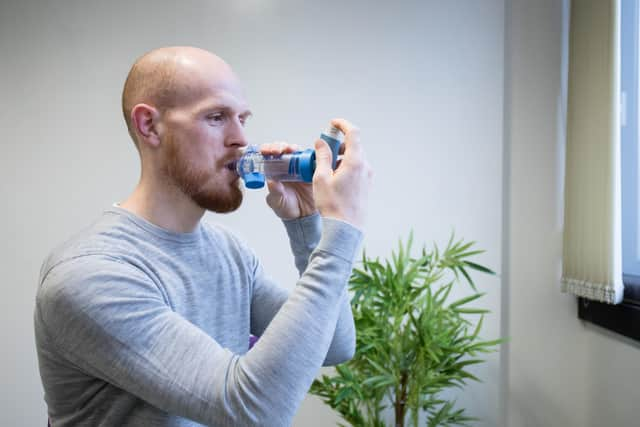What is asthma, what are the treatments available and what is it like to live with
and live on Freeview channel 276
Caroline Fredericks, respiratory nurse specialist at Asthma + Lung UK, said: "Asthma is a very common long-term lung condition. It affects the airways that carry air in and out of your lungs. Asthma can be life-threatening and every day, four people die of an asthma attack. People with asthma often have sensitive, inflamed airways."
Alison Latter commented on the Chichester Observer Facebook page that she was recently diagnosed with asthma after having difficulties with her breathing for the last 40 years as she says she didn’t have the ‘typical’ asthma symptoms.
Advertisement
Hide AdAdvertisement
Hide Ad“My brilliant GP that I have now has taken the time, and several appointments, to get to the root of the issue with a trial of various inhalers and peak flow monitoring,” she explained.
The common symptoms of asthma in adults are coughing, wheezing, tightness in the chest and feeling short of breath.
However, charity Asthma + Lung UK says that not everyone with asthma will get all of these symptoms, for example not everyone wheezes but it advises if you are experiencing one or more of these symptoms you should make an appointment with your GP.
Most people with well-managed asthma have symptoms now and then, but some people have them all the time, particularly the four per cent of people who have severe asthma.
Advertisement
Hide AdAdvertisement
Hide AdNicky Smith, 58, lives in Bognor Regis and has had asthma for about three years.


She said: “I got asthma when I was doing cleaning for someone and they didn’t have a hoover, only an old carpet sweeper. The dirt and dust got on my chest along with dust mites and caused damaged to my lungs.”
On the NHS website it says that ‘the exact cause of asthma is unknown, but can be linked to genetics, pollution and modern hygiene standards have been suggested as causes, but there's not currently enough evidence to know if any of these do cause asthma’.
While the CDC (Centres for Disease Control and Prevention) notes that the common triggers for the condition include dust mites, as well as tobacco smoke, outdoor pollution, pests such as cockroaches and mice, pets, mold, disinfectants which can trigger an asthma attack.
Advertisement
Hide AdAdvertisement
Hide AdNicky’s asthma is managed with a pink inhaler called Fostair and a gray one called Ventolin.
Inhalers are the most common way to manage the condition as they can help relieve the symptoms when they occur and stop symptoms developing, some people only need one type of inhaler while others need a combination inhaler that does both.
Another form of treatment is to take tablets, if using an inhaler alone does not help. The main tablets prescribed is Leukotriene receptor antagonists (LTRAs), these are taken to stop symptoms occurring.
Steriod tablets and theophylline are other forms of tablets that can be prescribed.
Advertisement
Hide AdAdvertisement
Hide AdNicky said: “I feel like it has sucked the life out of me, I am tired all the time makes me want to cry, when l can’t breathe well, when Covid first came here l was so scared l was going to get it and die.”
Caroline, from Asthma + Lung UK, said: “Whatever it is that triggers your asthma symptoms, the best way to stay well and cut your risk of an asthma attack is to take your preventer inhaler every day as prescribed to build up protection in your airways over time and carry your reliever inhaler at all times. However, if you are needing your reliever inhaler three times a week or more, this is a sign of untreated inflammation in your airways and it’s really important you make an appointment with your GP, nurse or pharmacist to discuss treatment options as soon as possible."
Barbara Corton, 40, lives in Eastbourne and was first diagnosed with asthma aged 16 but admits she was treated on and off from the age of 11.
The diagnosis came after Barbara suffered from continuous chest infections and coughing issues.
Advertisement
Hide AdAdvertisement
Hide AdHer condition is managed by taking a steroid inhaler, a tablet and reliever inhaler with steroid tablets when required and prescribed by the GP.
She said: “I am hospitalised generally annually - quite often around the same time of year. This used to be two to three times a year until better treatment was found. This has affected my work life. Also I am unable to use certain perfumes and air fresheners which affects my family members as they cannot use them around me as it could set off an attack. It affects all areas of your life.”
To someone who has recently been diagnosed Barbara said: “Try and work out what your triggers are as this will help you control it. Also make sure that you take your medication as prescribed as this is the only way to keep your asthma under control.”
The different types of asthma include allergic asthma, 'seasonal', occupational, non-allergic, 'exercise induced’, difficult asthma, severe asthma, ‘brittle’, adult onset asthma and childhood asthma.
Advertisement
Hide AdAdvertisement
Hide AdIf you want to talk to someone charity Asthma + Lung UK has a helpline: 0300 222 5800, Monday-Friday, 9am-5pm, WhatsApp service on 07378 606 728 or visit www.asthma.org.uk